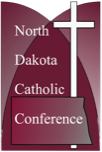Religious Freedom on College Campuses
By Christopher Dodson
Executive Director
North Dakota Catholic Conference
April 2021
Did you know that some of the campuses of the North Dakota University System prohibit Catholic student clubs from being truly Catholic?
This is one of those “I didn’t think it would happen here” stories.
Freedom of association goes hand-in-hand with freedom of speech and freedom of religion. Free speech and religious liberty mean little if people cannot join together under a shared belief and unite in their messaging and activities. Indeed, Jesus called us to come together. “For where two or three are gathered together in my name, there am I in the midst of them.” Mt. 18:20.
Free speech, religious freedom, and freedom of association are also part of the university experience. A college is a place where ideas can be shared, debated, and analyzed with respect for each other. It is also a place where students can unite with other students of similar interests and beliefs. This is why colleges and universities have so many student clubs.
How, then, did colleges and universities, including here in North Dakota, decide it was acceptable to infringe upon the right of student clubs to preserve their own mission?
It started some years ago. Under the guise of “diversity” and “inclusion” campuses started to require clubs to accept “all comers,” even if the “comer” did not agree with the club’s mission. If the club has a policy that restricts who can become a member or leader, the club is denied the same benefits as other clubs, such as access to meeting rooms, posting space, and use of student activity fees.
The Christian Legal Society (CLS) at Hastings College of Law, a part of the University of California, had a statement of faith that, among other things, required the members to be Christian and believe in traditional marriage. The law school said that the statement of faith violated the school’s all-comers policy. CLS challenged the policy and in 2010 the case reached the U.S. Supreme Court. In Christian Legal Society v. Martinez, the Supreme Court, in a 5-4 opinion authored by Justice Ginsberg, found that these policies do not violate the U.S. Constitution.
Some colleges and universities viewed the decision as an invitation to enact more such policies. We now know that some of North Dakota’s state-run campuses did just that.
Legislators introduced House Bill 1503 to protect students’ free speech and religious rights in several ways, including prohibiting the North Dakota University System from enacting “all-comers” policies. To the surprise of many, the university system admitted during testimony in the House that some of the campuses have already enacted such policies and it did not appear willing to change that practice. In fact, it opposes HB 1503 in its entirety.
The Trump Administration enacted a regulation prohibiting state-sponsored campuses from enacting all comers policies that discriminate against religious clubs. The North Dakota University System testified that it was in the process of revising its policies to comply with the regulation.
The proposed revision, however, does not remove the need for HB 1503. For one thing, it is apparent that the system is only making the change because it is required to by federal law, not because it is the right thing to do. The Biden Administration could rescind the rule and we would have no guarantee that religious clubs would be protected.
Second, the federal regulation applies only to religious clubs. Clubs based on ideas have no protections. Democratic clubs could not guarantee that their members be Democrats. Republican clubs could not guarantee that their members be Republicans. Pro-life clubs could not require that members and leaders believe in the sanctity of human life.
Insisting that student clubs be free to adhere to their own mission is not condoning undue discrimination. Nor is it about allowing discrimination based on race, sex, or even sexual orientation. It is about the preservation of the group’s beliefs. Student groups on the state-run campuses should not be discriminated against because of what they believe.
By the time this column appears in print, the fate of HB 1503 might be decided. Whatever the outcome, we must be vigilant about these creeping attacks on free speech and religious liberty.
What We Do
The North Dakota Catholic Conference acts on behalf of the Roman Catholic bishops of North Dakota to respond to public policy issues of concern to the Catholic Church and to educate Catholics and the general public about Catholic social doctrine.

Contact Us
North Dakota Catholic Conference
103 South Third Street, Suite 10
Bismarck, North Dakota
58501
1-888-419-1237
701-223-2519
Contact Us

